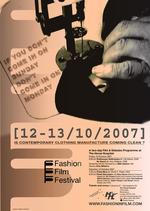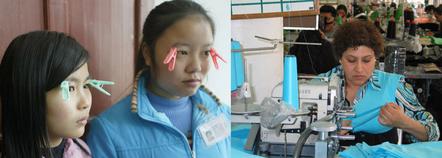If you don't come in on Sunday, don't come in on Monday:Is contemporary clothing manufacture coming clean?
 A two-day film event + panel discussion
12-13 October 2007
£7/£5 members & concessions
PROGRAMME
Friday 12 October 2008
8:00pm "Knitoscope Testimonies" video piece by Cat Mazza, 2006 (2,58 min)
"No Sweat" dir. Amy Williams, 2006 (54min)
Screening will be followed by a Q+A session with director Amy Williams
Saturday 13 October 2008
7:00 pm "China Blue" dir. Micha X. Peled, 2005 (86 min)
8:30 pm Panel discussion (speakers TBC)
This event will feature two documentaries and an artist video revisiting the highly troublesome subject of clothing sweatshops. In the beginning of the twentieth century, signs on the New York City sweatshop doors infamously announced: "If you don't come in on Sunday, don't come in on Monday." Since then, issues of exploitation in the garment industry have been subject to much criticism, debate and action, culminating in the 1990s labour legislation changes and formation of organisations such as the Fair Labour Association. So, just what has happened to sweatshops since these new regulations came into force?
Two documentary filmmakers, Micha X. Peled's (China Blue, 2005) and Amy Williams' (Sweat X, 2006), recently brought (or smuggled) their cameras inside clothing factories in Asia and North America respectively. Their intention was to show that despite the garment industry legislations, factories continue to operate in shady ways with labour conditions that continue to be alarmingly poor.
The ever topical issues raised by Peled's and Williams' documentaries will be picked up by a panel of clothing designers and manufacturers, representatives from trade unions and fair trade companies, journalists, academics and auditors. The discussion will address the garment workers current conditions, good practices of clothes manufacture, successes and failures of the 1990s campaigns
against sweatshops, the effectiveness of labour legislations and codes of conduct, consumer responsibility and the future of the apparel industry.
A two-day film event + panel discussion
12-13 October 2007
£7/£5 members & concessions
PROGRAMME
Friday 12 October 2008
8:00pm "Knitoscope Testimonies" video piece by Cat Mazza, 2006 (2,58 min)
"No Sweat" dir. Amy Williams, 2006 (54min)
Screening will be followed by a Q+A session with director Amy Williams
Saturday 13 October 2008
7:00 pm "China Blue" dir. Micha X. Peled, 2005 (86 min)
8:30 pm Panel discussion (speakers TBC)
This event will feature two documentaries and an artist video revisiting the highly troublesome subject of clothing sweatshops. In the beginning of the twentieth century, signs on the New York City sweatshop doors infamously announced: "If you don't come in on Sunday, don't come in on Monday." Since then, issues of exploitation in the garment industry have been subject to much criticism, debate and action, culminating in the 1990s labour legislation changes and formation of organisations such as the Fair Labour Association. So, just what has happened to sweatshops since these new regulations came into force?
Two documentary filmmakers, Micha X. Peled's (China Blue, 2005) and Amy Williams' (Sweat X, 2006), recently brought (or smuggled) their cameras inside clothing factories in Asia and North America respectively. Their intention was to show that despite the garment industry legislations, factories continue to operate in shady ways with labour conditions that continue to be alarmingly poor.
The ever topical issues raised by Peled's and Williams' documentaries will be picked up by a panel of clothing designers and manufacturers, representatives from trade unions and fair trade companies, journalists, academics and auditors. The discussion will address the garment workers current conditions, good practices of clothes manufacture, successes and failures of the 1990s campaigns
against sweatshops, the effectiveness of labour legislations and codes of conduct, consumer responsibility and the future of the apparel industry.

Since the Nike, the Gap, Wal-Mart and even Disney sweatshop scandals of the 1990s, trade unions and the garment industry have taken action implementing codes of conduct and social audits in factories. Having to acknowledge the existence of labour exploitation and abuse to their offshore manufacture, Nike may have "cleaned up" by putting into practice stricter codes and audits. In an effort to become "transparent" the global retailer even recently published details of 700 of their contracting factories. But has this practice been followed by other manufacturers? Today, numerous anti-sweatshop campaigners and pressure groups work alongside companies, aiming to improve labour and pay conditions. At the same time, new clothing companies crop up branding themselves "sweatshop-free." Still, thousands of manufacturers don't participate in the anti-sweatshop movement and bad practice such as grave negligence or falsifying evidence during audits remains a recurrent pattern. Clandestinely shot, China Blue (dir. Micha X. Peled, 2005) follows the 17-year-old factory worker Jasmine and her friends through the meanders of a blue-jeans factory in China. Jasmine, who had to leave her home province for a job in the city, is soon bitterly disillusioned with the harsh working environment she encounters. Despite appallingly low wages, Jasmine and her fellow workers are constrained to work around the clock in order to meet the tight delivery schedules imposed on them by big orders from the West. Fined if found asleep and forbidden to strike, Jasmine and her friends need to find alternatives to their exhaustion in order to keep going. China Blue is a poignant testimony to the persistent inhumanity of the Chinese garment manufacture and a comment on the economic pressures applied by the global fashion industry. No Sweat (dir. Amie Williams, 2006) takes us to Los Angeles, the largest and most dynamic area of garment production in North America. The film follows two self-proclaimed ethical labels American Apparel and SweatX T-shirt which have been widely recognised for providing fair working conditions in their factories. Founded by the entrepreneur Dov Charney and built from the ground up, American Apparel's anti-sweatshop rhetoric broadcasts care and workers benefits such as healthcare, paid leave, company-subsidised lunches, free English language classes and even on-site masseurs. Similarly, the T-shirt company SweatX, with a start-up capital of 2.5million US dollars funded by Ben & Jerry's Ben Cohen, started with a determination to operate ethically. No Sweat takes us behind the scenes of these two 'worker-friendly' companies and unveils a different much more distressing reality. Knitoscope Testimonies (Cat Mazza, 2006) is a computer-animated programme that translates the artist's hand-knitted panels into moving images. The video focus on labour movement, continuing Mazza's involvment with anti-sweatshop activism.
